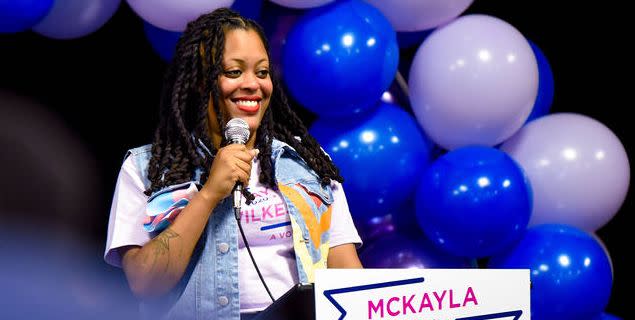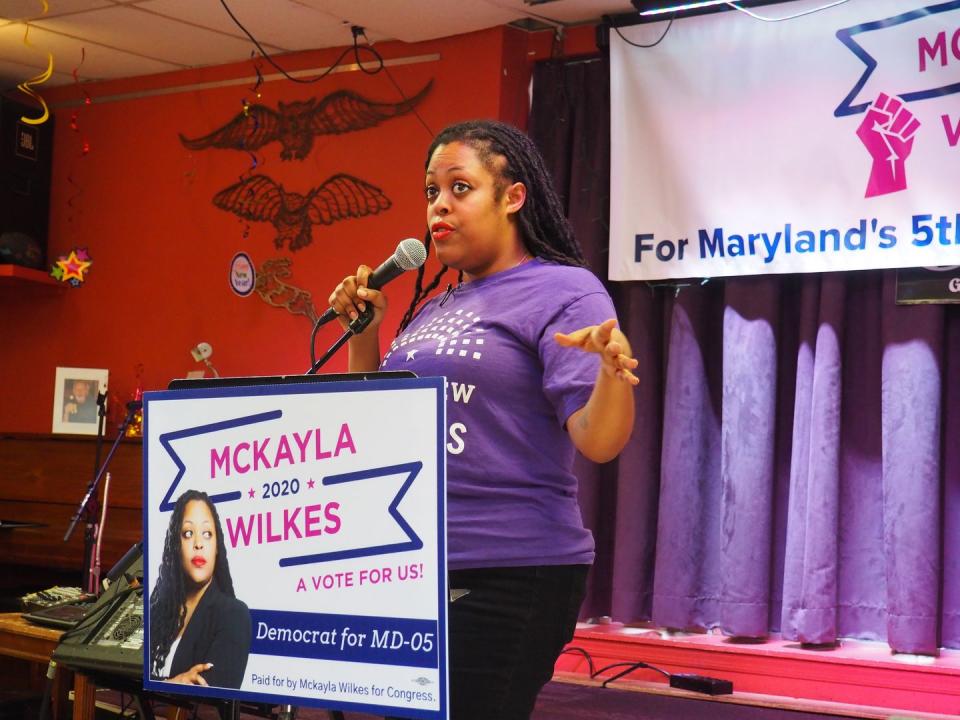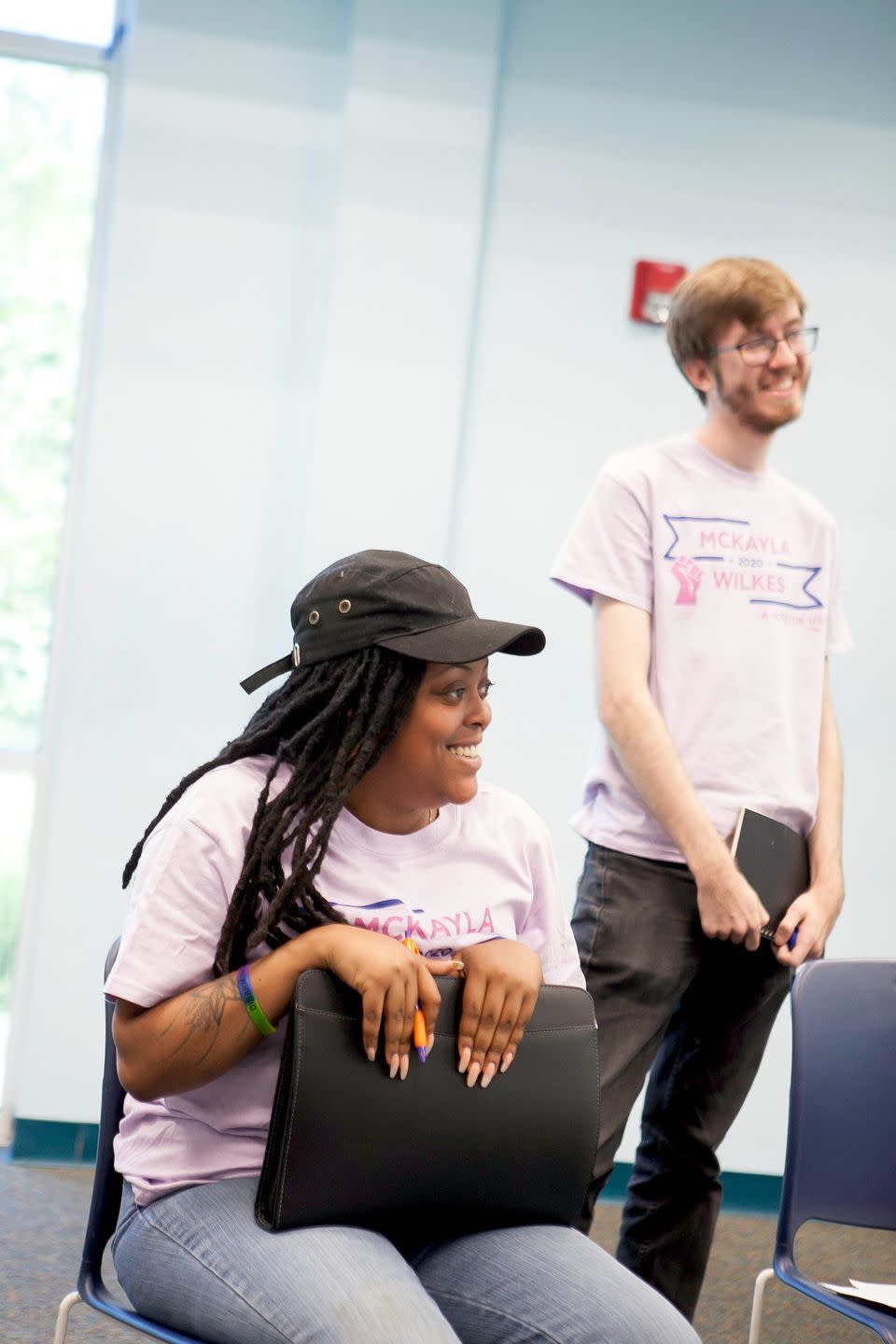Mckayla Wilkes Isn’t Afraid of Her Past. Now She’s Looking to Congress for Her Future.

What does it take to be qualified to run for office? Since Donald Trump, a man with zero political experience (getting roasted at the White House Correspondents Dinner doesn’t count) burst through the old boundaries like the Kool Aid man, we’ve crossed into a realm where basically anything goes. A battery of young, progressive women saw Trump’s victory, looked in the mirror, and thought, “Well, if he can do it, why not me?” And in the 2018 midterms, they came charging through the opening in his wake.
Until recently, Mckayla Wilkes did not think of herself as Congressional candidate material. The 29-year-old “always thought that I had to have the checklist of what it meant to run for Congress,” she told ELLE.com over Zoom. “You have to intern on the Hill. You have to start on local government and then state government and then work your way up to the federal level. You have to have a college degree, your degree in law.”
Wilkes didn’t have any of those things. What she did have: an intimate understanding of how the American criminal justice system inflicts trauma; firsthand knowledge of how inadequate so-called “access” to health care can be; a smattering of community college credits; and two young children.
When we spoke, Wilkes was quarantining with her kids, 5 and 9, her fiancé, and their dog. Due to the COVID-19 pandemic, her campaign has shifted to be entirely virtual: It’s all phone banking, social media, and hosting weekly town halls over Zoom. It’s quite the shift from last spring, when she was Googling “how to run for Congress,” changing her major from psychology to political science, and learning the ins and outs of super PACs and corporate interest groups.

Now she’s one week out from a primary election against longtime incumbent Steny Hoyer, the second highest-ranking Democrat in the House. Hoyer, who last year said “there’s room in our party” for lawmakers who oppose abortion rights, has represented Maryland’s fifth district since 1981—nearly a decade before Wilkes was born.
Wilkes responded to those comments of Hoyer’s by tweeting what is perhaps the ultimate rejoinder: “As a woman who has gotten an abortion, there is no room for pro-life Democrats in Congress!”
.@LeaderHoyer should change his name to @MiddleGroundHoyer. There’s is absolutely no room for middle ground when it comes to a women’s body..MY body.
As a woman who has gotten an abortion 🗣There is no room for pro-life Democrats in Congress!https://t.co/cM2LMiO8Gf— Mckayla Wilkes for Congress (@MeetMckayla) September 18, 2019
Wilkes’ story—giving context and humanity to the bullet points that could be used to discredit her—is her strategy. She knows they’re unconventional credentials, but she’s banking on the belief that voters will respond to a candidate who has been through it, for whom abstract policy is a lived reality.
“I've always been a very, very outspoken person,” Wilkes said. She didn’t have any inhibitions about sharing the story of her abortion (at 12 weeks, when she was 19 years old). She did struggle, though, with speaking about being arrested for marijuana possession as a teenager. “Really, I was ashamed of that,” she said. “But it's because of the stigma that comes from people being impoverished or being, I don't want to say a victim, but a survivor of the criminal justice system.” She called her mom and her aunt for a gut-check: Was she doing the right thing? Their advice: Be honest. “My aunt told me, ‘As long as you come up with it yourself, no one can use it against you.” Now this narrative is front and center in her “A Vote For Us” campaign ad.
My life changed forever on September 11th, 2001.
This is the story of a young girl who needed help processing grief, but was shackled instead.
It's a story of fighting back.
It’s the story of a movement, bigger than any one person, that has only just begun. Please watch! 💜 pic.twitter.com/s9TJkCBHx9— Mckayla Wilkes for Congress (@MeetMckayla) April 10, 2020
When Wilkes’ mother was pregnant with her, Wilkes’ father was murdered. Wilkes was raised by her mom and her aunts—one of whom, Sharon Carver, was a civilian employee killed at the Pentagon on September 11th. In her grief, Wilkes started running away from home and skipping school; she wound up in juvenile detention for truancy. She was in and out from the time she was 14 until she was 17. As a teenager, she was also arrested (though never charged) for possessing marijuana.
“I know a lot of people think that [juvenile detention] is like, ‘kiddie jail,’” she said. “But it’s very traumatic to go through something like that. In my situation, to have lost a loved one, and then have to process all of this [and be] taken away from your family, having to visit your parents in a jumpsuit like you’re some kind of like criminal. It takes a toll on you, especially as a child.”
“You know, the first time that they incarcerated me, I was scared,” she went on. “I didn't understand what was happening… They put me in a cement room by myself with a mat on the floor. It's a really traumatic experience to have to go through.”
“I was a kid. I didn't see the politics of it,” she said. “But I knew that I wanted to help people one day that were in my situation that needed someone to talk to, or that needed help, and was met with a criminal justice system instead.”
After high school, Wilkes started studying psychology, planning on becoming a therapist. But as an adult, she got “caught in a very vicious cycle of being stuck in traffic court.”
Wilkes was “impoverished,” she said, working minimum wage jobs and driving on a suspended license to get to work. She says her options were to pay $1,000 in fines, which she didn’t have, or spend two nights in jail, even though she was six months into a high-risk pregnancy. She chose the latter.
When Wilkes told this story publicly for the first time during the campaign, she was surprised by what she described as a mostly-positive reaction from the public. “So many people are like, ‘Girl, that’s not a reason for us not to support you. We have a real criminal in the White House!’ I was like, well, thanks! You have a point.”

The same year as her traffic court arrest, Wilkes suffered a pulmonary embolism and was admitted to the hospital with blood clots behind each of her legs. The medicine she needed was, she remembers, “probably $25,000 or $27,000 for a 30-day supply,” and her insurance did not cover it.
“I was like, why is this being allowed to happen?” she said. “I wasn't into politics at this time, but I started to think to myself: Why am I paying for health insurance if they're going to let me die? And not only let me die, but I'm pregnant right now.” At once infuriated and inspired, Wilkes started to look into “the policies that govern insurance companies, to the criminal justice system,” and to her representative: Steny Hoyer, who she calls “the epitome of why I never was politically engaged.” Hoyer, she said, is the kind of politician who “wants to get our votes and then we never hear from them, they never do anything for us.”
That was 2014. One year later, her political “aha moment” arrived in the form of Bernie Sanders’ first presidential run. “When I heard him speak about health care [and] the criminal justice system, all of that just clicked… I decided that one day I was going to run for office.” The real game changer came in 2018, when Alexandria Ocasio-Cortez, whose progressive views align with Wilkes’, defeated a 10-term incumbent, Democratic Caucus Chair Joe Crowley.
“When I saw AOC, I was like, wow. Someone like me can run,” Wilkes said. “I have a story to tell, and she had a story to tell. People resonated with her because she was a regular person. And so I was like, ‘Well, I know a lot of people will resonate with my story.’ It really does empower me to see somebody else do it first.”
Though there are parallels to Ocasio-Cortez’s path, Wilkes will have to win over a district that is whiter (54% white) and wealthier (average household income: almost $90,000) than the working-class, majority-Latinx swath of Queens and the Bronx represented by AOC. And of course, now that AOC’s done it, the element of surprise is no more: Probably every middle-aged moderate man in Congress is looking over his shoulder for the liberal woman who’d like to snag his seat out from under him.
“I'm not the only person that's running on a platform like mine,” Wilkes said. “There are hundreds if not thousands of us across the country. But we all have to try for some of us to get in.”
You Might Also Like


